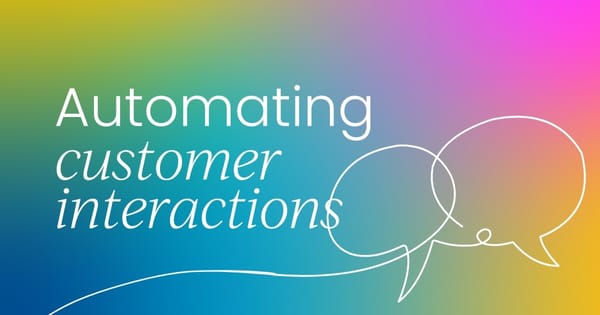Automation technology and customer marketing can sometimes feel at odds. With customer marketing being a customer-first role, often working with customers on a personal basis, the idea of ceding control of this relationship to automation could feel like a failure.
But here’s the thing. No customer marketer can do it all.
From our State of Customer Marketing report, we know that the vast majority of customer marketers work in teams of one, from startups to enterprise-sized companies. Even managing 10 customers can be a lot without automating at least some of the processes.
In this article, we’ll go through:
- What Martech is
- The importance of automating customer marketig
- How Martech can be used to optimize and personalize the customer experience
- How Martech proves its ROI and saves you time.
Defining Martech in marketing
As many of you may know, Martech, or marketing technology, is an umbrella term that refers to any software or tool marketers use to streamline, automate, and optimize various marketing processes and activities.
In 2024, the use of martech in customer marketing is extremely common, particularly when considering the rapid development of AI tools over the last few years. Invoca found that nearly 90% of marketers are planning to increase their investment in AI, and an equal number said they will have a budget dedicated to AI-powered martech.
So why has Martech become such an important staple for customer marketing teams?

Importance of automating customer interactions in modern marketing
The main three characteristics of modern marketing that make such a demand for this kind of technology are scalability, efficiency, and competition.
Scalability
The business market, like the technological one, has experienced massive growth over the past few years. As a result of consumer behavior changing to a more digital-first mindset, population growth, and globalization, the sheer volume of customers has increased exponentially.
It’s no longer realistic to manage such a high volume of accounts without some level of automation. Automation enables more consistent, tailored interactions across all touchpoints.
Efficiency
Due to its increased scale, automation can help alleviate the pressure of certain tasks, specifically repetitive ones like email campaigns, social media posting, and customer segmentation. Martech is a tool to free up marketing teams' workload so they can focus on more strategic, high-value activities.
Competitive Advantage
When it comes to navigating the fast-paced marketplace, a lot of ways to get ahead of competitors rely on keeping up with the demand.
As automation becomes an industry standard, companies that fail to leverage these tools risk falling behind more tech-savvy competitors in attracting and retaining customers.
In an era defined by heightened customer expectations and an explosion of marketing channels, automation has become essential for customer marketing teams to operate effectively and maximize the impact of their efforts.
Optimizing the customer journey
One of the main ways martech can help is in making the touchpoints of the customer journey as consistent and efficient as possible.
Identify key touchpoints for automation
To begin, it’s best to think about the best touchpoints you can hand over to automation.
This’ll be points in the customer journey that are:
- Very repetitive - These will be the marketing activities that are frequently repeated and don't require any complex decision-making.
- High-volume interactions - Any touchpoints that involve all or a large number of customers (Like onboarding).
- Are easy impact and low effort - Prioritize touchpoints where automation can have the biggest impact on customer experience while also being low effort when it comes to implementation.
Some common touchpoints that’ll make good candidates for automation will be things like:
- Welcome emails
- Abandoned cart reminders
- Post-purchase follow-ups and feedback requests
- Customer support chatbots for common queries
- Lead nurturing email sequences
Personalization at scale
Martech doesn’t lose its usefulness when it comes to making more personalized experiences. But you should use data collection and analysis alongside automation in that case.
Use customer data to enable personalized experiences
This will begin with the usual data mapping, from data collection and analysis to segmentation and content planning. To begin with, the best understanding possible is to ensure you have a 360-degree view of your customers and their customer profiles.
But once you understand your customer data, where do you choose to implement martech to support your personalization efforts?
- Start with simple personalizations like using the customer's name or referencing recent purchases, then gradually increase complexity as you become more comfortable with the technology you’ve chosen.
- Use machine learning algorithms to predict the next best actions or offers, such as recommending purchases, picking upsell opportunities, or anticipating churn risks.
- Implement real-time personalization on high-traffic channels based on things like page views, time on page, hover actions, or search queries.
- Personalize email campaigns based on behavioral triggers and preferences.
Improved efficiency and ROI
So, how does this help in the long run when it comes to things like ROI?

Time and cost savings from automating repetitive tasks
When it comes to automation, time is the biggest saver. Customer marketing is a role that requires a lot of investment in customer relationships, and be it one-to-one, to customer advocates, or to engaged communities, each of these responsibilities requires time and attention.
You’re going to struggle with prioritizing customer needs when you have hundreds of welcome emails looming over your head. Let’s have a quick look through some more specific examples and their benefits:
- Email Marketing Automation. Email sequences can be triggered and sent based on user behavior.
- ROI Impact: Consistent communication will encourage increased engagement rates from the customer while also reducing your own manual labor.
- Social Media Management. Posts will be scheduled in advance, and automated responses will be programmed to answer common FAQs.
- ROI Impact: Your brand presence online will remain consistent, and your response will be faster regardless of where your customers are in the world.
- Lead Scoring and Routing. Maretch can automate the scoring of leads based on behavior and demographics.
- ROI Impact: Faster lead qualification overall with improved efficiency for sales.
Data-driven insights to optimize marketing efforts
Automation implementation can require a lot of planning to build into your existing processes. Once a part of your daily workload, automation can also help set you up for success in future strategies.
More specifically, martech technology can help with:
- Customer Journey Analysis. Automated touchpoints can log data and offer insights into how customers interact across touchpoints.
- ROI Impact: This data can pinpoint areas that need attending to, instantly identifying the issue and optimizing marketing spend.
- Attribution Modeling. Automation helps you understand which marketing efforts drive conversions, especially when monitoring real-time customer interactions.
- ROI Impact: This knowledge can help you identify certain copy, messaging, and more attractive designs to customers.
- A/B Testing at Scale. When deciding on new copy, you can use martech to establish automated testing of multiple variables in campaigns.
- ROI Impact: This information can continuously improve overall campaign performance and attraction in current and future campaigns.
- Customer Lifetime Value (CLV) Prediction. Automation can help identify high-value customers and potential high-value prospects.
- ROI Impact: This can help with retention and growth efforts across all customer sentiments, from churn risks to potential brand champions.
Conclusion
Marketing technology (Martech) can significantly enhance customer marketing efforts, particularly in the areas of personalization, automation, and data-driven decision-making. As artificial intelligence and machine learning capabilities continue to advance, we can expect even more sophisticated personalization and predictive capabilities.
However, it's important to remember that technology is an enabler, not a solution in itself. It should not replace true one-to-one customer interactions. Success with martech relies on you having a clear strategy from the get-go and a commitment to continuous learning and optimization.


 6 min read
6 min read
 Follow us on LinkedIn
Follow us on LinkedIn




